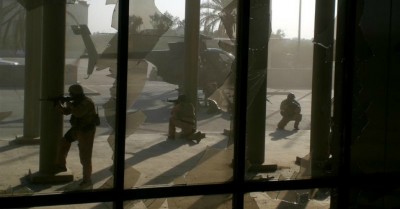Beyond Blackwater Massacre, Renewed Concern Over Rise of Mercenary Armies
"The outsourcing of national security to private firms creates risks for human rights and accountability," warns UN

Blackwater security guards in Iraq. (Photo: Heath Powell/cc/flickr)
Following the sentencing of four private security guards convicted in the notorious 2007 massacre of innocent Iraqi civilians, attention has shifted to the growing role such private mercenaries are having on battlefields throughout the world.
On Monday, three former employees of Blackwater Worldwide were given thirty-year prison sentences while one guard, Nicholas Slatten, who fired the first shot, was sentenced to life in prison for a shooting spree which resulted in the deaths of 14 Iraqi civilians in Nissour Square. The accused say they will appeal.
In a statement on Tuesday, human rights expert Elzbieta Karska, chair of the United Nations working group on the use of mercenaries, said that while the group welcomed the sentencing, such examples of accountability are the “exception rather than the rule.”
“The outsourcing of national security to private firms creates risks for human rights and accountability,” Karska said. The UN is calling for an international treaty to “address the increasingly significant role that private military companies play in transnational conflicts.”
Critics of the military industrial complex have long-warned about the difficulties of holding private security firms accountable for rights violations in foreign war zones. As Karska notes, these four Blackwater security guards are merely the tip of the iceberg for an industry that has expanded exponentially since the wars in Iraq and Afghanistan first broke out.
On Tuesday, New York Times reporters James Risen and Matthew Rosenberg published a story highlighting what they say is the real legacy of Blackwater.
The private security industry, they write, “has fallen from public view since the height of the wars in Iraq and Afghanistan. But the two conflicts sped the maturation of security firms from bit players on the edge of global conflicts to multinational companies that guard oil fields in Libya, analyze intelligence for United States forces in Afghanistan, help fight insurgents in parts of Africa and train American-backed militaries in Iraq, Afghanistan and elsewhere.”
Though solid numbers are hard to come by, Risen and Rosenberg note that “estimates of industry revenues range from a few billion dollars to $100 billion.”
While the State Department refused to divulge to the Times how many private security contractors they hire, in January, U.S. Central Command (Centcom) reported having 54,700 private guards under its jurisdiction. According to the Centcom report, 40,000 of those contractors are in Afghanistan alone, more than a third of which are American—giving new perspective to the U.S. footprint in that country when President Barack Obama says that less than 10,000 troops are deployed there.
In response to the outcry after the Nissour Square shooting, Blackwater founder Erik Prince, who has been left virtually unscathed, renamed the company Xe Services before selling it in 2010. It now operates under the name Academi and has received more than $300 million in Pentagon funding for drug war efforts in Afghanistan.
Investigative reporter Jeremy Scahill, who created a short film about the atrocity, noted this fact after the sentencing:
Blackwater–under a new name–still works for the US government. If corporations are people, they should have been given the death penalty.
— jeremy scahill (@jeremyscahill) April 14, 2015

